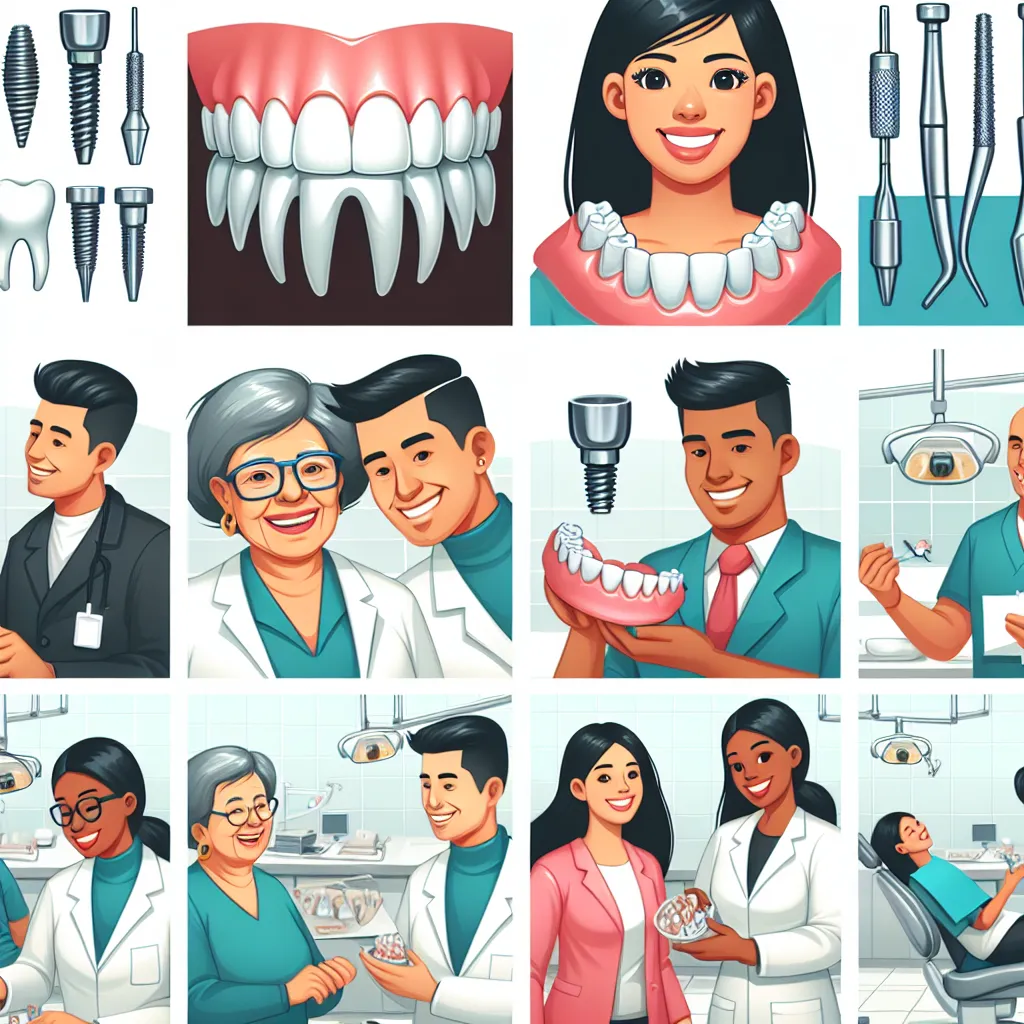Missing teeth can feel like a punch to your confidence and your ability to enjoy food. Dental implants and dentures are two of the most common ways to replace missing teeth, each with their own quirks and perks. Knowing the differences between dental implants and dentures helps us make the right choice for our lifestyle, budget, and health. Let’s break down what these options really mean for our daily lives—no sugarcoating, no jargon.
What Are Dental Implants and Dentures?
Dental implants and dentures both solve the same basic problem: missing teeth. But they do it in completely different ways. Dental implants are artificial tooth roots, often made of titanium, that get anchored into the jawbone. Dentures are removable sets of artificial teeth that sit on top of our gums.
Why does this matter? Because the way our replacement teeth attach affects how they look, feel, and function. Some of us want a solution that feels as close to natural teeth as possible, while others just want to smile and chew again without a huge investment.
Table: At-a-Glance Comparison
| Feature | Dental Implants | Dentures |
|---|---|---|
| Permanence | Fixed, long-term | Removable, may need replacing |
| Comfort | Feels like real teeth | May feel bulky or slip |
| Chewing Strength | High | Lower (varies by fit) |
| Jawbone Health | Maintains bone | Can lead to bone loss |
| Cost | High upfront, less over time | Lower upfront, more maintenance |
| Maintenance | Brush/floss like teeth | Special soaking/cleaning |
| Procedure Length | Months (healing required) | Weeks |
Why Dental Implants and Dentures Matter
Tooth loss isn’t just a cosmetic thing. It affects our nutrition, speech, facial shape, and even our mood. Dental implants and dentures let us eat what we want, smile without worrying, and speak clearly. But the solution that’s right for us depends on our age, health, budget, and even our patience.
Let’s get real: Not everyone wants to go through surgery for dental implants, and not everyone is comfortable with removable dentures. We deserve clear, practical info that helps us weigh our options.
Key Benefits of Dental Implants and Dentures
Dental Implants
- Long-lasting: With good care, implants can last decades, sometimes a lifetime.
- Natural feel: Implants look and feel like real teeth—no clicking or sliding.
- Bone health: Implants stimulate the jawbone, preventing bone loss.
- Maintenance: Just brush and floss like usual. No soaking in a glass by the bed.
Dentures
- Non-invasive: No surgery, just impressions and fittings.
- Affordable: Lower upfront cost, especially for full-mouth replacements.
- Quick results: Fitted in weeks, not months.
- Flexible: Good for people with weak gums or low bone density.
Drawbacks and Limitations
Dental Implants
- Cost: Implants can cost thousands per tooth. Insurance rarely covers the whole thing.
- Surgery required: Not everyone can—or wants to—go through the procedure.
- Time: Healing can take months, especially if bone grafting is needed.
- Not for everyone: People with weak jawbones or certain health issues may not qualify.
Dentures
- Fit and comfort: Dentures may slip, especially lower ones, and can cause sore spots.
- Bone loss: Without tooth roots or implants, the jawbone can shrink over time.
- Maintenance: Daily cleaning, overnight soaking, and regular refitting or replacing.
- Diet limits: Crunchy, sticky, or chewy foods can be tough to handle.
How to Choose: What Really Matters
We all have different priorities, so here’s what we should think about before picking dental implants or dentures.
1. Age and Health
- Younger people may want the permanence of implants.
- Older adults or those with health issues might prefer the simplicity of dentures.
2. Bone Strength
- Implants need strong jawbones.
- Dentures work even if bone loss has already happened.
3. Budget
- Implants cost more upfront, but can be cheaper long-term.
- Dentures are more affordable at first, but may need more frequent replacement and care.
4. Lifestyle
- Are we active, social, or self-conscious about our smile?
- Implants handle tough foods and social situations better, but dentures can be just fine with good fit.
Practical Tips for Evaluating Our Options
- Ask about all-in costs: Implants may require bone grafts, extractions, or custom abutments.
- Try before committing: Some dentists offer trial dentures to help us get used to the feel.
- Consider “mixed” solutions: Partial dentures or implant-supported dentures can balance pros and cons.
- Think about maintenance: Are we ready to clean dentures daily, or do we prefer brushing like normal?
- Plan for the future: Our needs and budgets might change, so flexibility is key.
Real-World Success Stories
1. The Reluctant Retiree
A 68-year-old woman was nervous about surgery and cost. She chose full dentures. At first, she struggled with the fit, but after two adjustments, she felt comfortable enough to eat steak again. Her only regret? Not getting them sooner.
2. The Young Dad
A 35-year-old dad lost three teeth in a bike accident. He wanted to avoid a removable solution, so he went with dental implants. The process took six months, but now he says he forgets which teeth are real.
3. The Hybrid Approach
A middle-aged teacher with weak jawbones couldn’t get full implants, so her dentist suggested implant-supported dentures. With just four implants on the bottom, her new teeth snap in place. She can eat apples and never worries about slipping in class.
Most-Asked Questions
How long do dental implants last?
Dental implants can last 20 years or more, sometimes for life, if we take care of them.
Do dentures look fake?
Modern dentures look much more natural than they used to, but a perfect fit and skilled lab work make all the difference.
Will insurance cover dental implants or dentures?
Most insurance covers some denture costs, but implants are rarely fully covered. Always check our plan and ask for a detailed estimate.
Can I switch from dentures to implants later?
Yes, but bone loss from wearing dentures may make implants harder or require bone grafting.
Are dental implants painful to get?
The surgery is usually done with anesthesia, so there’s little pain during the procedure. Soreness afterward is common but temporary.
How often do dentures need to be replaced?
Dentures usually last 5–10 years before needing replacement due to wear or changes in our mouth shape.
What foods should I avoid with dentures?
Sticky candies, tough meats, nuts, and some crunchy veggies can be tricky. Cutting food into small pieces helps.
When it comes to dental implants and dentures, there’s no one-size-fits-all answer. We each have different needs, budgets, and personalities. By understanding the real differences, benefits, and challenges, we can find the solution that’s right for us and get back to smiling without worry.
Dental Implants and Dentures
Dental implants and dentures are popular solutions for missing teeth, but they serve different needs. Implants are screw-like posts anchored into the jawbone, offering a permanent, natural-feeling fix that helps maintain bone health. Dentures are removable prosthetics that sit on the gums, making them more affordable but less stable.
| Feature | Implants | Dentures |
|---|---|---|
| Longevity | 20+ years | 5-10 years |
| Comfort | High | Moderate |
| Cost | Higher | Lower |
Improvements: Implants prevent bone loss and offer better function, but require surgery. Dentures are easier to fit but may slip and cause gum sores.
Call us today to explore your best teeth-replacement options with . Our experts will help you smile confidently again!
Frequently Asked Questions About Dental Implants and Dentures
How long do dental implants last?
Dental implants can last 20 years or more, sometimes a lifetime, with proper care and maintenance.
Are dentures noticeable or fake-looking?
Modern dentures are designed to look very natural, especially when fitted correctly by a skilled dentist.
Can I switch from dentures to dental implants later on?
Yes, but bone loss from long-term denture use may require additional procedures like bone grafting before getting implants.





